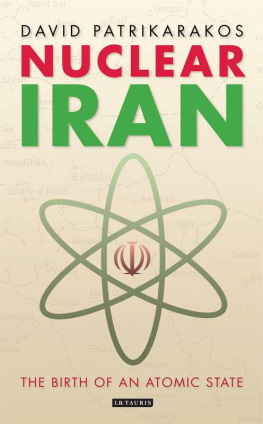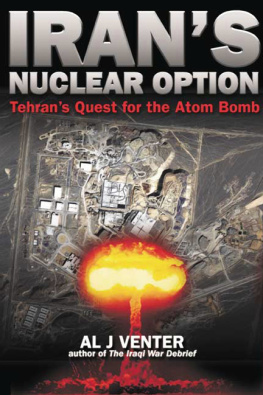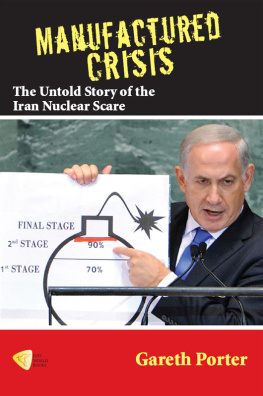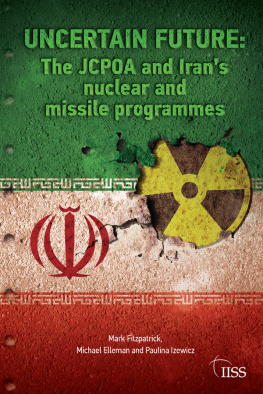This book is well worth reading. It is an engaging account of the whole story of Iranian nuclear policy, and the material on the Shahs programme creates interesting context for current developments. It represents a well-told story which, for those interested in Iran, and those who wish to learn more about the place given the nuclear crisis, will be a very useful source and reference point.
Professor Michael Clarke, Director General, Royal United Services Institute for Defence and Security Studies (RUSI)
An interesting and informative window into Iranian thinking a unique and fascinating book.
Mark Fitzpatrick, Director, Non-Proliferation and Disarmament Programme, International Institute for Strategic Studies
Patrikarakos has produced a meticulously researched study of Irans nuclear programme and situated it within the broader historical and political context. This fluent account, drawn from both archival and oral sources, provides one of the best and most readable accounts of a programme which has come to define Irans relations with the West. An essential read for the general reader and specialist alike.
Ali Ansari, Professor of History at University of St Andrews and Director of the Institute for Iranian Studies
A very comprehensive and useful description of the development of Irans nuclear programme. A topical account, it is essential reading for political leaders, journalists and all others interested in international politics and international relations highly recommended.
Professor Frank Barnaby, Nuclear Issues Consultant, Oxford Research Group
By his meticulous and painstaking study, David Patrikarakos has given us an engaging and comprehensive account of what is often described as the Iran Nuclear Crisis. The first detailed study of its kind, he seems to have not left a stone unturned to discover the facts and subject them to intelligent and even-handed analysis. It is a must read in all the power centres that are so acutely and urgently concerned with Irans nuclear project, including the IAEA, UN, America, EU and Iran.
Dr Homa Katouzian, the Iran Heritage Foundation Research Fellow, St Antonys College, and Member of the Faculty of Oriental Studies, University of Oxford
This thoroughly readable book adds greatly to the current debate on the Iranian nuclear programme. It should be read by all those who are interested in this topic.
Professor Paul Rogers, Professor of Peace Studies, University of Bradford
An outstanding book the first scholarly work on Irans nuclear programme that grasps the programmes historical, cultural and political impetus and clearly explains its elements of continuity over time. It will become a valuable resource for researchers on this subject.
Dr. Ali Vaez, Director, Iran Project, Federation of American Scientists
This book is a watershed in the understanding of the Iranian nuclear programme. No other book quite like it exists. It is a cogent, highly readable and very well-written account of the programmes evolution from its inception to the present day that succeeds in unravelling the technical and political complexities which have often clouded our understanding of the programme. It shows both a deep understanding of modern Iran and of its nuclear programme. The book will be invaluable to policy analysts, politicians, diplomats and journalists in Europe and the USA and is a must read for anyone with an interest in international affairs.
Siavush Randjbar-Daemi, Lecturer, SOAS
David Patrikarakos is a writer and journalist who has written for the New Statesman, the Financial Times, the London Review of Books, Prospect and the Guardian.

Published in 2012 by I.B.Tauris & Co Ltd
6 Salem Road, London W2 4BU
175 Fifth Avenue, New York NY 10010
www.ibtauris.com
Distributed in the United States and Canada
Exclusively by Palgrave Macmillan
175 Fifth Avenue, New York NY 10010
Copyright 2012 David Patrikarakos
The right of David Patrikarakos to be identified as the author of this work has been asserted by the author in accordance with the Copyright, Designs and Patents Act 1988.
All rights reserved. Except for brief quotations in a review, this book, or any part thereof, may not be reproduced, stored in or introduced into a retrieval system, or transmitted, in any form or by any means, electronic, mechanical, photocopying, recording or otherwise, without the prior written permission of the publisher.
ISBN: 978 1 78076 125 1
eISBN: 978 0 85773 270 5
A full CIP record for this book is available from the British Library
A full CIP record is available from the Library of Congress
Library of Congress Catalog Card Number: available
Typeset in Janson by MPS Limited
CONTENTS
ACKNOWLEDGEMENTS
As is customary, the list of people I must thank for helping to bring this book to fruition is long yet certainly incomplete. Most immediately, for taking the time to read through the manuscript and point out errors and possible improvements I owe a considerable debt to Norman Dombey and Ali Vaez, whose scientific expertise filled the black hole of my ignorance. Their patience and generosity in answering my questions was unending and appreciated. It goes without saying that all errors are mine alone, most likely from a failure to listen or indeed understand their points correctly.
I also owe a huge debt of thanks to Alan Ramon Ward and Bryn Harris, both for their friendship over many years and for taking time out of their own extensive intellectual pursuits to read through various sections of the book, often at very short notice and at times when I could no longer view the page with any objectivity. Their comments and suggestions have made all the difference. Thanks also to my dear moon-face Tanya Lawrence and to Kayvan Sadeghi, whose input also greatly improved the text.
Hossein Heirini Moghaddam and James Piscatori (who also taught me how to think) advised me on this book when it was in embryonic form. Edmund Herzig helped bring it to its early fruition and, with Homa Katouzian, guided me so expertly through modern Iran at Oxford. Dominic Brookshaw did his level best to teach me Persian, Reza Sheikholeslami gave me excellent advice on the Shahs period while Ali Ansari (and his work) has been an inspiration for me in understanding modern Iran. All these men are true scholars of the Middle East; I have only benefited from their teaching and guidance.
I must also thank all the staff (academic and non-academic) at Oxfords Middle East Centre and especially at Wadham College whose kindness (and forbearance) ensured I spent many happy years there. And of course Tom Woodman, without whom nothing subsequent would have been possible.
Ben Judah has been a continual source of support as we begin this long game together. The same is true of Ioanna Koutzoukou while the support of Alexis Hood was also invaluable, and always appreciated. Chris Mitchell and Dai Richards must also be thanked, as must David Mainwaring who was an excellent source of advice about the publishing world in general.
And of course, my mother, who is everything, and my brother, Phillip, who is with me every day. Rene must also be thanked for this support over many years. And my father, without whom this book would most certainly have never seen the light of day. His unyielding support throughout the writing process was, in the end, crucial.
David Patrikarakos, July 2012
A NOTE ON TRANSLITERATION
The transliteration of the Persian words and names in this book is based on a simplified phonetic system, without diacritical accents though distinguishing between the ayn and the hamzeh. The aim has been to make the Persian names and terms accessible to non-specialist readers.
Next page





